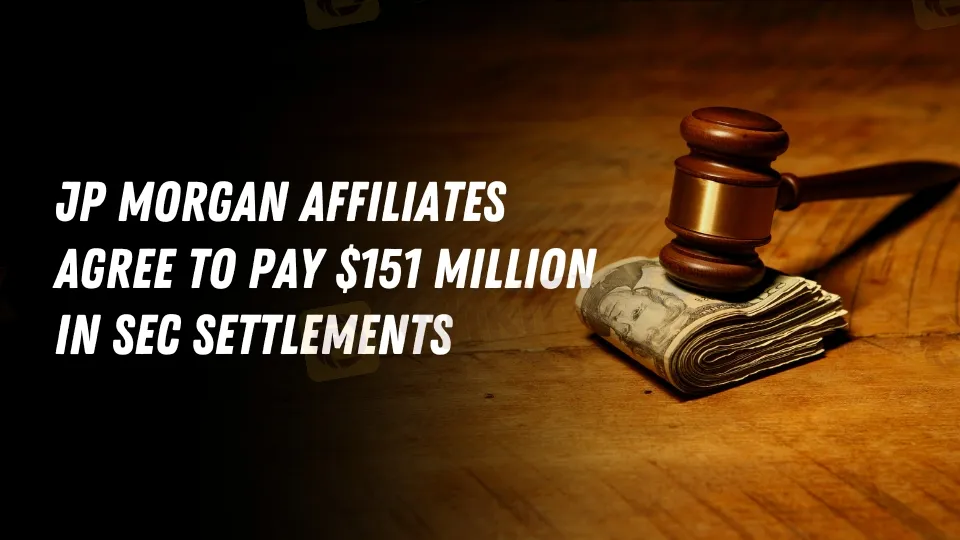简体中文
繁體中文
English
Pусский
日本語
ภาษาไทย
Tiếng Việt
Bahasa Indonesia
Español
हिन्दी
Filippiiniläinen
Français
Deutsch
Português
Türkçe
한국어
العربية
JP Morgan Affiliates Agree to Pay $151 Million in SEC Settlements
Abstract:JP Morgan faces regulatory penalties and investor reparations due to SEC findings of misleading disclosures, fiduciary breaches, and conflicts of interest.

JP Morgan Securities LLC (JPMS) and JP Morgan Investment Management Inc. (JPMIM), two affiliates of JPMorgan Chase & Co., have agreed to a $151 million settlement to address Securities and Exchange Commission (SEC) claims. The allegations, which include five different enforcement proceedings, claim a variety of crimes, such as false disclosures, breaches of fiduciary responsibility, and conflicts of interest that harmed their clients.
According to the SEC's investigation, JP Morgan affiliates failed to fulfill regulatory criteria designed to safeguard investors from the dangers of self-dealing and conflicts of interest. JP Morgan consented to large civil fines and voluntary reimbursements to investors affected by the firm's conduct, without admitting or contesting the SEC's conclusions. While fines were imposed in most instances, the SEC waived further penalties in one case in recognition of JPMS' cooperation and remedial efforts to resolve the underlying concerns.

Key Enforcement Actions and Financial Penalties
The SEC's inquiry focused on five key actions:
- Conduit Private Funds: JPMS was accused of misleading investors regarding the administration of “Conduit” private funds, which aggregated client money in private equity or hedge funds before distributing public company stock. Despite guaranteeing quick share sales, JP Morgan used discretion in scheduling, resulting in large losses for certain investors. JPMS will pay $100 million, which includes a $90 million voluntary payment to harmed customers.
- Portfolio Management Program: According to reports, from 2017 to 2024, JPMS failed to disclose financial incentives that prompted advisers to prefer JPMS's Portfolio Management Program over third-party alternatives. According to the SEC, assets in this program increased from $10.5 billion to $30 billion over the time in question. JPMS will be fined $45 million for failing to act in its clients' best interests.
- Clone Mutual Funds: Between 2020 and 2022, JPMS advised higher-cost “Clone” mutual funds over identical, more cheap exchange-traded funds (ETFs). According to the SEC's decision, JPMS and its salespeople did not account for the pricing differences while advising consumers. JPMS avoided extra fines by promptly self-reporting and paying out $15.2 million to impacted clients.
- Joint Transactions: In 2020, JPMIM banned joint transactions that benefited a foreign money market fund to the detriment of three US-based mutual funds under its supervision. JPMIM was fined $5 million and issued a cease-and-desist order as a result of this.
- Primary Trades: According to reports, JPMIM engaged in primary trades that violated SEC guidelines from 2019 to 2021, totaling more than $8 billion in transactions. These deals, carried out without the proper exemptions, resulted in conflicts of interest. JPMIM was fined $1 million for alerting the SEC of these transactions and cooperated with the investigation.
Statement from the SEC on JP Morgan's Regulatory Failures
Sanjay Wadhwa, Acting Director of the SEC's Division of Enforcement, said that JP Morgan's actions violated regulations meant to avoid conflicts of interest and safeguard investors. “With today's settlements, which include multiple self-reports and large voluntary payments to harmed investors, JP Morgan is being held accountable for its regulatory failures,” Wadhwa told the press.
Last Thoughts
JP Morgan's settlements highlight the need for transparent investing policies. The SEC's measures highlight the regulator's commitment to holding big financial firms responsible. These enforcement proceedings serve as a reminder to companies to prioritize their clients' interests and closely comply with compliance obligations. As JP Morgan progresses, their commitment to addressing and resolving these problems will be critical in regaining investor confidence and regulatory trust.

Disclaimer:
The views in this article only represent the author's personal views, and do not constitute investment advice on this platform. This platform does not guarantee the accuracy, completeness and timeliness of the information in the article, and will not be liable for any loss caused by the use of or reliance on the information in the article.
Read more

Investing Capital in Focus as Complaints on Withdrawal and Other Issues Mount
Explore this guide we have exposed Investing Capital, which has mounted concerns for traders by disallowing withdrawals and making them lose their hard-earned money.

4 Warning Signs That Indicate You May Get Scammed in Your Forex Investments
In this blog, we will share with you a guide telling you about the tactics fraudsters employ to dupe investors.

Global Brokers Vs. Indian Rules: Why They Struggle in India
RBI issued a warning last year against 75 forex brokers. Those brokers are globally popular and regulated in other countries, but they are banned in India. Only few brokers even have physical offices located in India. So, why do global brokers face so many challenges in entering the Indian market?

Aetos: A Closer Look at Its Licenses
With multiple regulatory entries and one license now revoked, Aetos stands as a broker requiring closer scrutiny from investors, particularly those prioritizing license scope and jurisdictional compliance.
WikiFX Broker
Latest News
Tokenized Stocks: Innovation or Just Another Wrapper?
Gold Rush Again: What's Driving the Bullion Market Crazy Ahead of US Jobs Data?
XTB Launches Tax-Advantaged Retirement Accounts in Poland
Zaffex Broker Review
ECB Ends Easing Cycle, But The Eurozone Crisis Is Just Beginning
Amazon deploys its 1 millionth robot in a sign of more job automation
MT4 and MT5 Platforms - Helping Traders Up Their Forex Trading Game
A bare-bones deal is Europe's best hope in trade talks with the U.S., sources say
10-year Treasury yield remains higher despite weak ADP jobs report
Blueberry Markets Revamps its Website
Currency Calculator


